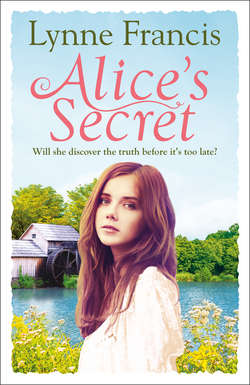Читать книгу Alice’s Secret: A gripping story of love, loss and a historical mystery finally revealed - Lynne Francis - Страница 20
Chapter Thirteen
ОглавлениеAlys had been so impatient to see the family tree that when Moira finally placed it in front of her that evening, she felt a stab of disappointment. It had been roughly drawn up on a sheet of paper torn from a foolscap notebook. The names at the bottom of the page, Alys and her siblings George and Edward, and those of Moira and Kate, plus her father David were, of course, all familiar to her, along with Eileen: Kate and Moira’s mum. The generations above that included Elisabeth, Eileen’s mother, then Alice, Elisabeth’s mother, names new to Alys until this afternoon. She skimmed over dates and siblings. Elisabeth had none, but Alice was the eldest of five, born to Sarah and Joe Bancroft. No name was given for the father of Elisabeth, Alys noticed. Beyond that, the piece of paper frustratingly provided no further clues.
‘Do you mind if I hang onto this for a bit?’ Alys asked as they sat down to eat.
‘No, just take care of it. It’s the only copy,’ said Moira. She was feeling unaccountably tired today and looking forward to an early night. She was thankful yet again for Alys’s presence – without her she certainly couldn’t have kept the café running. Alys had gone way beyond the call of duty, not only proving herself to be a good baker, but also having a fine eye for how to enhance the business. It wouldn’t be long before she would be wanting to be on the move, Moira thought, and she was dreading the day, although she realised that it wasn’t fair to try to keep her here. She dragged herself out of her reverie as she became aware that Alys was speaking to her.
‘Are you okay?’ her niece was asking, concerned. ‘You’re looking a bit pale, you’ve barely said a word and you haven’t eaten very much.’
‘I’m fine,’ Moira said, and smiled. ‘Just a bit tired this evening. Think I need a long bath and an early night.’
‘Well, if you’re sure that’s all? I hope you’re not overdoing it.’ Alys rose from the table and started to clear away. She paused, then turned to Moira. ‘I’d like to find out more about the history of the area, the mills and such. Get a feel for what it might have been like to live here a hundred or so years ago, now that I’ve discovered we’re all from this area. Have you got any books about it?’
‘Local history, do you mean?’ Moira settled herself on the sofa. ‘No books I’m afraid, but there’s a little museum here in the village, and another one over in Nortonstall. There’s a lot in both of them about the area. You need to remember that it wouldn’t have been like this then.’ Moira winced and adjusted the cushions behind her back, which still played up if she had been on her feet all day. ‘It would have been an industrial landscape down in the valley, not the beautiful countryside we see now. I expect that the paths that you’ve been walking are much the same as in the past, though,’ she said. ‘The workers would have used them to get to the mill from all directions. Lots of children worked there, too. They were employed in the mills because they were small and had nimble fingers. They had to go under the machines to retrieve things, do jobs that adults were too big for. The hours and conditions were awful in the mid-nineteenth century. You should definitely take a look at the museums – you’ll learn a lot there. I found it all a bit upsetting, to be honest, but it’s worth knowing about, especially while you’re here.’
Alys’s next half-day off brought more dark clouds and bursts of heavy rain. The thought of exploring the countryside, her normal half-day occupation, didn’t appeal. So, she made her way over to Nortonstall and spent a few hours in the museum there. It was housed in an old mill, now mainly given over to workshops and studios, but it gave her an idea of the scale of the place, the forbidding walls and the towering chimney, all set in a cobbled courtyard that must once have rung with the clatter of clogs and the bustle of business. She was sure that the Industrial Revolution must have been on the curriculum at school, but clearly it hadn’t stuck in her memory. Now that she was in the landscape that was home to so much of it, her imagination was fired up. She pored over the old black-and-white photos of the area, staring hard at the people captured in them and wondering whether one of them was Alice. She devoured the information about the canals, the weavers’ cottages, the different kinds of mill in the area, how Northwaite had declined in importance as Nortonstall had grown, its importance fuelled by the arrival of the railways. She’d found the depiction of a typical working day particularly startling, especially the length of the journey that so many workers in the outlying parts undertook each morning and evening on foot, before they even started their ten-hour day. And once they were at work, they were under constant pressure, bullied by the overlookers to meet deadlines and targets. So that wasn’t a new thing, she thought to herself wryly as she lingered over a cup of coffee in the mill café, watching the rain puddling in the courtyard. Life must have been such a struggle in those days. She just hoped that there had been some recompense, something to make life worth living.
